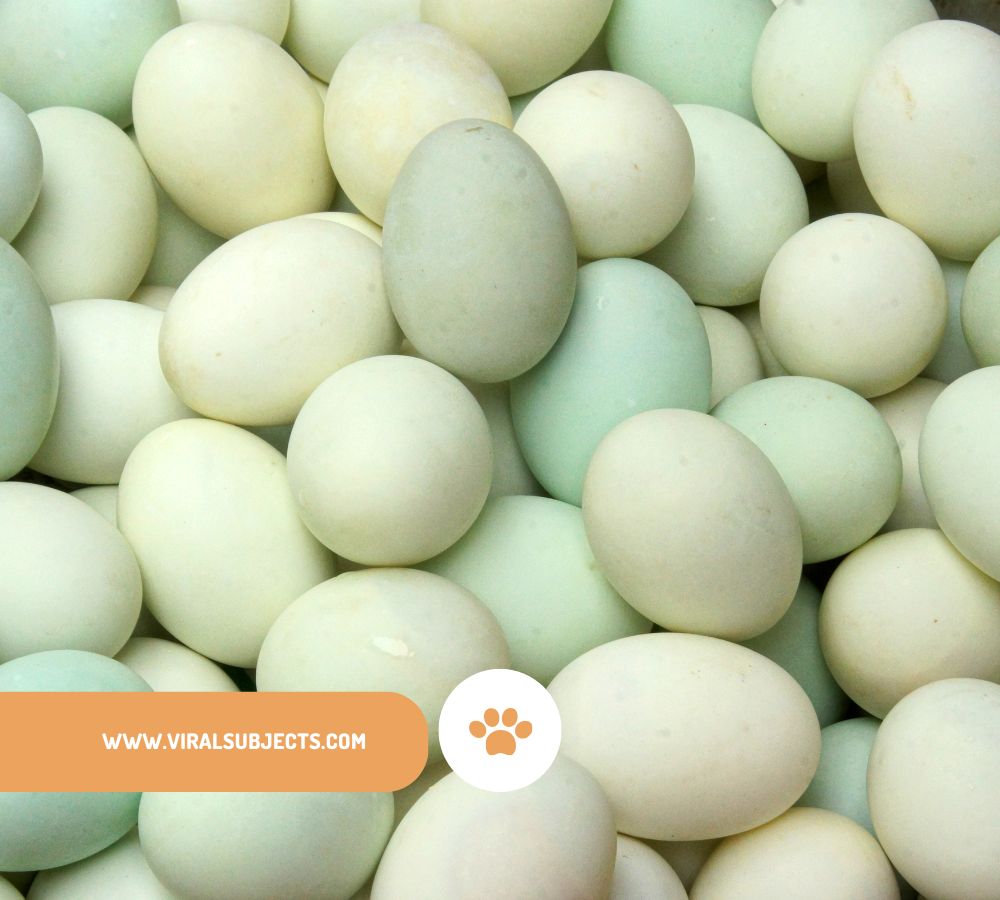Can Dogs Eat Duck Eggs?
As a loving pet owner, you’re always looking for ways to improve your dog’s health and happiness. It’s natural to wonder if the foods you enjoy can benefit your furry friend too. Duck eggs, often praised for their rich nutritional content, might seem like an appealing addition to your dog’s diet. But are they safe? This comprehensive guide explores everything you need to know if Can Dogs Eat Duck Eggs?
By the end of this article, you’ll understand the benefits, potential risks, and best practices for introducing this unique food to your pet’s meals.
What Makes Duck Eggs Different From Chicken Eggs?
Understanding Duck Eggs
While you might be more familiar with chicken eggs, duck eggs are an equally versatile and nutritious option. They are larger and contain a richer yolk, packed with nutrients that can potentially benefit dogs.
| Nutrient | Duck Eggs (per egg) | Chicken Eggs (per egg) |
|---|---|---|
| Calories | 130 | 70 |
| Protein (grams) | 9 | 6 |
| Fat (grams) | 10 | 5 |
This table highlights how duck eggs surpass chicken eggs in calories, protein, and fat content. These attributes make duck eggs a dense source of energy, perfect for active dogs.

Can Dogs Eat Duck Eggs Safely?
The short answer if Can Dogs Eat Duck Eggs? is yes, but with some important caveats. Duck eggs are generally safe for dogs when offered in moderation and prepared correctly.
Benefits of Duck Eggs for Dogs
Duck eggs are a powerhouse of nutrients that can benefit your dog in several ways:
- Protein-Rich: Supports muscle growth and repair.
- Omega-3 Fatty Acids: Promote a healthy coat and reduce inflammation.
- Vitamins and Minerals: High levels of selenium and vitamin D enhance immune function and bone health.
- Great for Allergies: Dogs with chicken or beef protein allergies may tolerate duck eggs better.
Potential Risks
Despite their benefits, there are some risks associated with feeding duck eggs to dogs:
- High Calorie Content: Overfeeding can lead to obesity, particularly in less active dogs.
- Raw Egg Risks: Feeding raw eggs could expose your dog to salmonella or cause a biotin deficiency.
- Food Sensitivities: Some dogs may develop an allergic reaction, although this is rare.
How to Safely Introduce Duck Eggs to Your Dog’s Diet
Introducing any new food to your dog requires a gradual approach to ensure their system can handle it.
Step-by-Step Introduction
- Start Small: Begin with a small portion—such as 1/3 of an egg for small dogs or 1/2 for larger breeds.
- Monitor for Reactions: Watch for any changes in behavior, digestion, or skin condition.
- Gradual Increase: If tolerated, slowly increase the portion size while keeping it as an occasional treat.
Proper Serving Methods
When preparing duck eggs for your dog, choose methods that retain their nutrients without adding harmful elements.
Cooked Duck Eggs
Cooking is the safest option to eliminate bacteria and make the nutrients more bioavailable. You can serve them boiled, scrambled (without seasoning), or poached.
Raw Duck Eggs
If you prefer raw feeding, ensure the eggs come from a reliable source to minimize the risk of contamination.
Creative Duck Egg Recipes for Dogs
Adding variety to your dog’s meals can make mealtime exciting. These simple recipes incorporate duck eggs in safe, dog-friendly ways.
Duck Egg and Veggie Scramble
| Ingredient | Quantity |
|---|---|
| Duck egg | 1 |
| Cooked spinach | 1 tablespoon |
| Chopped carrots | 1 tablespoon |
Instructions:
- Whisk the duck egg and pour it into a non-stick pan over low heat.
- Add cooked spinach and carrots.
- Stir until fully cooked, let it cool, and serve as a topping for your dog’s regular meal.

Duck Egg and Sweet Potato Treats
| Ingredient | Quantity |
|---|---|
| Duck eggs | 2 |
| Mashed sweet potato | 1/2 cup |
| Whole wheat flour | 1/4 cup |
Instructions:
- Mix all the ingredients into a dough.
- Shape into small biscuits and bake at 350°F (175°C) for 20 minutes.
- Let cool and store in an airtight container.
These treats are a healthy, homemade alternative to store-bought snacks.
FAQs About Dogs and Duck Eggs
Can dogs eat duck eggs every day?
No, duck eggs should be an occasional treat due to their high calorie and fat content. Overfeeding can lead to weight gain.
Are raw duck eggs better for dogs than cooked?
Cooked eggs are safer, as cooking eliminates harmful bacteria and reduces the risk of biotin deficiency caused by raw egg whites.
Can puppies eat duck eggs?
Yes Can Dogs Eat Duck Eggs, but only in small portions and after consulting with your veterinarian to ensure they meet your puppy’s dietary needs.
Are duck eggs good for dogs with allergies?
Absolutely! Duck eggs are an excellent protein source for dogs allergic to common proteins like chicken or beef.
What should I do if my dog has an adverse reaction to duck eggs?
Discontinue feeding immediately and consult your veterinarian. Signs of a reaction might include vomiting, diarrhea, or itching.
Duck eggs can be a nutritious and delicious addition to your dog’s diet when served responsibly. With their rich protein content and unique nutrient profile, they offer several health benefits, particularly for dogs with food allergies. However, it’s essential to introduce them gradually, serve in moderation, and choose cooked preparations to ensure safety.
Can Dogs Eat Duck Eggs? the answer is yes but you should not forget all the instruction and advice mention in this article.
